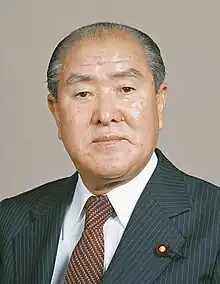Zenkō Suzuki
Zenkō Suzuki (鈴木 善幸, Suzuki Zenkō, 11 January 1911 – 19 July 2004) was a Japanese politician who was Prime Minister of Japan from 1980 to 1982. He was the last prime minister to have been born in the Meiji era.
Zenko Suzuki | |
|---|---|
鈴木 善幸 | |
 Official portrait, 1980 | |
| Prime Minister of Japan | |
| In office 17 July 1980 – 27 November 1982 | |
| Monarch | Shōwa |
| Preceded by | Masayoshi Itō |
| Succeeded by | Yasuhiro Nakasone |
| Minister of Agriculture and Forestry | |
| In office 24 December 1976 – 28 November 1977 | |
| Prime Minister | Takeo Fukuda |
| Preceded by | Buichi Oishi |
| Succeeded by | Ichiro Nakagawa |
| Minister of Health and Welfare | |
| In office 3 June 1965 – 3 December 1966 | |
| Prime Minister | Eisaku Satō |
| Preceded by | Hiroshi Kanda |
| Succeeded by | Hideo Bo |
| Chief Cabinet Secretary | |
| In office 18 July 1964 – 9 September 1964 | |
| Prime Minister | Hayato Ikeda |
| Preceded by | Yasumi Kurogane |
| Succeeded by | Tomisaburo Hashimoto |
| Minister of Posts and Telecommunications | |
| In office 19 July 1960 – 8 December 1960 | |
| Prime Minister | Hayato Ikeda |
| Preceded by | Haruhiko Uetake |
| Succeeded by | Yoshiteru Kogane |
| Member of the House of Representatives | |
| In office 25 April 1947 – 17 July 1980 | |
| Personal details | |
| Born | 11 January 1911 Yamada, Iwate, Empire of Japan |
| Died | 19 July 2004 (aged 93) Tokyo, Japan |
| Political party | Liberal Democratic Party (1955–2004) |
| Other political affiliations | Liberal Party (1948–1950) Democratic Liberal Party (1950–1955) |
| Children | Shun'ichi Suzuki Chikako Suzuki |
| Alma mater | Tokyo University of Fisheries |
| Signature |  |
Early life and education
Suzuki was born on 11 January 1911, Yamada, Iwate Prefecture, the eldest son of a fishery owner.[1][2] He graduated from Tokyo University of Fisheries in 1935.[3]
Career
_begroet_premier_Suzuki_op_het_Binnenhof%252C_Bestanddeelnr_931-5512.jpg.webp)
Suzuki joined the Liberal Party in 1948, and helped merge it with another right of center party to establish the Liberal Democratic Party (LDP) in 1955. He was Minister of Health from 1965 to 1966, and Minister of Agriculture & Fisheries from 1976 to 1977.
Suzuki was appointed Prime Minister following the sudden death of Masayoshi Ōhira, who died of a heart attack during a general election campaign. The sympathy vote generated by Ohira's death resulted in a landslide for the ruling LDP, handing Suzuki the largest parliamentary majority any Prime Minister had enjoyed for many years. He chose not to run for reelection to the presidency of the LDP in 1982, and was succeeded by Yasuhiro Nakasone.
He served during a period of instability; cabinet members frequently changed, and parties were often split by fractional politics. His diplomatic skills allowed him to chair his party's executive council ten times, winning him support in his early career. Despite his foreign policy gaffes as prime minister, he later helped further foreign relations with the United States, during a 1988 summit with Ronald Reagan.
Personal life and death
Suzuki's daughter, Chikako Aso, is the wife of Taro Aso, who served as the Prime Minister of Japan from 2008 to 2009.[4] His son Shun'ichi Suzuki serves in the Diet.
Suzuki died at the International Medical Center of Japan in Tokyo of pneumonia on 19 July 2004 at the age of 93.[5] His wife died in 2015.
Honours
From the corresponding article in the Japanese Wikipedia
- Grand Cordon of the Order of the Chrysanthemum (July 2004; posthumous)
References
- Ueda, Masaaki (2002). Kōdansha Nihon jinmei daijiten. Kōdansha. Shuppan Kenkyūjo, 講談社. 出版研究所. Kōdansha. 鈴木善幸. ISBN 4-06-210800-3. OCLC 50718841.
- "鈴木善幸 行政改革に道筋をつけた元首相、死去". Imidas. Shueisha. Retrieved 6 March 2022.
- "Zenko Suzuki". The Independent. London. 21 July 2004. Archived from the original on 7 May 2022. Retrieved 7 January 2013.
- Albrecht Rothacher (1993). The Japanese Power Elite. London: Palgrave Macmillan. p. 50. doi:10.1007/978-1-349-22993-2.
- "Former Prime Minister Suzuki dies at Tokyo hospital, aged 93". The Japan Times. Tokyo. 20 July 2004. Archived from the original on 11 July 2021.